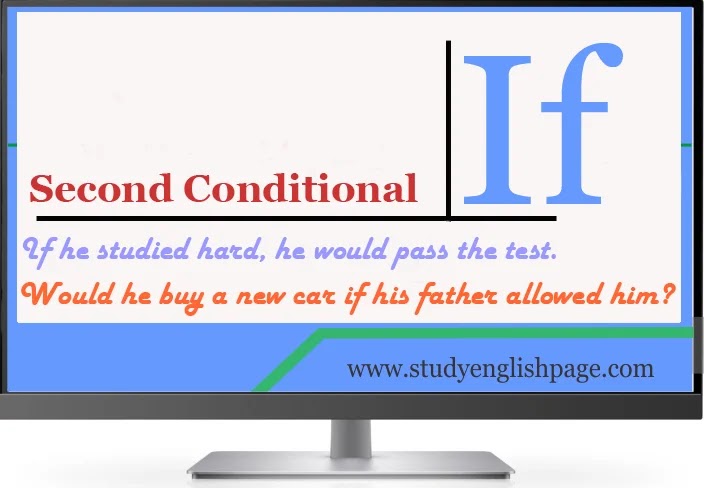Second Conditional
Conditional sentences have
great importance in English grammar. In your life, you need to talk based on
conditions. All conditional sentences are called conditionals. Conditionals
include four types. One of them is the second conditional.
What is the second conditional?
The second conditional is a
conditional sentence that we use for an event that does not have a possibility
to occur in the present or future. In other words, the second conditional is a
hypothetical condition that does not have a possibility to occur in the present
or future. The second conditional shows unreal or untrue situations in the present
or future.
- If I informed her on time, she would be present here now.
This example means that neither the person informed nor the girl is present. He makes a hypothetical condition for her presence. Consequently, it shows an untrue situation in the present.
How to form the second conditional?
The second conditional consists
of two clauses. One is conditional and the other is a result (main) clause. We
use simple past tense in the conditional clause and the modal verbs would,
could, might, or should in the result clause. A comma is used after the
conditional clause when it comes first.
Structure of the Second Conditional
Conditional clause + Comma + Result clause
Result clause + No comma + Conditional clause
Or
If + Simple Past Tense + Comma + Subject +
Would/could/might/should + Verb (base form)
Subject + Would/could/might/should + Verb (base form) + If +
Simple Past Tense
- If we had more money, we would visit around the world.
- We would visit around the world if we had more money.
Examples of the Second Conditional
- If she proposed to me, I would marry her.
- If John studied hard, he could pass the test.
- If John excused Toshio, they might become friends.
- He would pass the trial if he joined a driving school.
- John would not marry Lisa if I did not convince her.
- What would you do if I did not pay you back the money?
- They would start a new business if their business flopped.
- If I were the principle of this school, I would change some policies.
- If she received that money, she would waste it on extravagant items.
- If they informed me earlier, I would cook something delicious for them.
Negative Sentences of the Second Conditional
As per the general rule, we add the word of negation “not” to an auxiliary verb. Similarly, we add “not” to the auxiliary verb in the second conditional sentence.If + simple past tense + Comma + Result clause (Sub + Aux + Not + Verb +………)
- If they did not waste time in the market, they would not miss the flight.
- If I did not invest in different businesses, I would be out of money.
- We would not have an accident if he did not attend the call.
Questions of the Second Conditional
Questions of the second
conditional are asked about the unreal situation in the present or future. They
are asked to know what someone would do if the condition which is now untrue
was true.
Structure
If + Simple past tense + Comma
+ Result clause (Auxiliary + Subject + Verb +………)
- If they did not invite you, would you mind that?
- If he apologized for what he did, would you pardon him?
Or
Result clause (Auxiliary + Subject
+ Verb +………) + If + Simple past tense
- Would you help the poor if you could help them?
- Would he buy a new car if his father allowed him?
Remember that we use a wh-question word before an auxiliary if there is one.
- What would you buy if your father gave you some money?
- If you had an opportunity to start a business, what would you start?
Were instead of Was in the Second Conditional
We know that we use simple past
tense in the second conditional clauses. When we need to use "be" in a
conditional clause, we use "were" with all subjects. Many grammarians insist on
using were even with first-person singular and third-person singular.
- If I were there, I would not let them go out.
- If he were a teacher, he would teach at a high-rank university.
- If Lisa were unmarried, I would marry her.
Remember that it is also
possible to use was with any singular subject.
- If she was here, she would meet us.
Frequently Asked Questions
What is the difference between first conditional and second conditional?
They are conditional sentences.
The first conditional shows an event that has a possibility to happen in the present
or future when a certain condition takes place.
The second conditional is a
hypothetical condition that does not have a possibility to occur in the present
or future. It is just based on assumption.
Can we use second conditional to make suggestions or recommendations?
Yes, we can use the second
conditional for suggestions or recommendations but for hypothetical or unreal
situations.
Why do we use were instead of was in the second conditional?
We use were with “I” and third
personal singulars because the second conditional is in subjunctive mood and
we don’t use was in subjunctive mood.





0 Comments